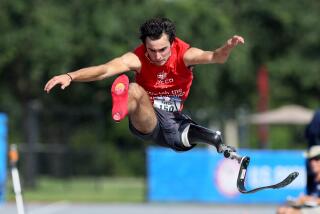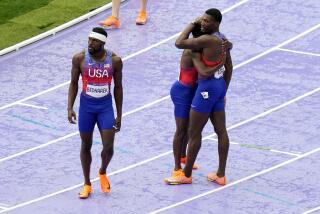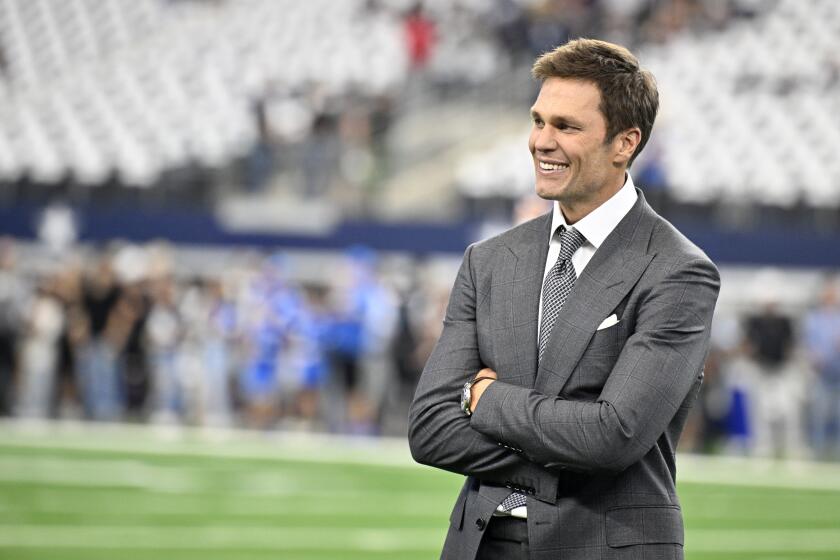Stories to watch at Olympic track and field trials
EUGENE, Ore. — USA Track and Field recently resolved its lengthy administrative turmoil by hiring Max Siegel, a former NASCAR and music industry executive, as its chief executive. Now the organization’s focus can shift to supporting athletes and raising the sport’s Olympic medal count from 23 at the 2008 Beijing Games to its stated goal of 30 in London.
Making the U.S. team will be half the battle. The trials, which began Thursday, figure to be toughest in the sprints and hurdles, traditionally Team USA’s strongest events. Hurdlers won seven medals at Beijing, led by the men’s sweep in the 400-meter hurdles and Dawn Harper’s victory in the women’s 100-meter hurdles.
Here are five story lines to follow at the trials, which run through July 1 at Hayward Field:
Penalties paid? Justin Gatlin, the 2004 100-meter gold medalist, served a four-year suspension and lost his world record after testing positive for banned steroids in 2006, but some critics contend he should be permanently disqualified from the Olympics. Gatlin, 30, said he’s “older, wiser and a little grittier” after his exile. He might be the strongest U.S. hope to breakJamaica’s stranglehold in the 100. His season-best time of 9.87 seconds is among the swiftest in the world, behind Jamaica’s Usain Bolt (9.76, 9.79, 9.82) Yohan Blake (9.84) and Asafa Powell (9.85). Gatlin might get a break because Walter Dix, who won bronze in the 100 and 200 at Beijing and took silver in both events at last year’s world championships, has had a hamstring problem. LaShawn Merritt, the Beijing 400-meter champion, also returns to competition after a 21-month ban for using a male-enhancement product. He has the world’s fastest 400 time this year, 44.19 seconds.
Can Tyson Gay’s surgically repaired hip hold up? Gay, a three-time U.S. champion in the 100 and the American-record holder, returned to competition a few weeks ago after undergoing surgery last July. He ran in a “B” heat and was timed in 10 seconds, which probably won’t get him onto the U.S. team. If his hip is strong, the 100 final could be a great race among Gay, Gatlin, Dix and Darvis Patton.
Will the third time be the charm for Allyson Felix? Twice an Olympic silver medalist in the 200, she plans to pursue the 100-200 double after experimenting with a 200-400 double. “It was really about what would help me run the best 200,” Felix said Thursday. Her supremacy in the 200 could be challenged by 400-meter specialist Sanya Richards-Ross, who has run the world’s top 200 time this year, 22.09 seconds. Richards-Ross also has the fastest time in the 400, 49.39 seconds. “The 200 is shaping up to be one of the more exciting events of these trials,” Richards-Ross said.
World’s best athlete? Bryan Clay of Glendora won decathlon silver at Athens and gold at Beijing and is trying to become the first decathlete to win three Olympic medals. He’s likely to be challenged by two-time world champion Trey Hardee, who’s recovering well from elbow surgery. Ashton Eaton, the 2011 world decathlon silver medalist and the current world indoor heptathlon champion, trains in Eugene and could have home-crowd advantage.
Whatever Lolo wants? Lolo Jones won the 100-meter hurdles at the 2008 U.S. trials and was leading at Beijing before clipping the next-to-last hurdle and stumbling to seventh place. She has two indoor 60-meter hurdle world titles and a lot of endorsements, but her season-best time of 12.75 seconds ranks behind eight other U.S. women. This is her chance to show substance behind the hype. “We have amazing women,” said Kellie Wells, the 2011 U.S. champion. “It’s just going to be execution, mental strength and fun.”
More to Read
Go beyond the scoreboard
Get the latest on L.A.'s teams in the daily Sports Report newsletter.
You may occasionally receive promotional content from the Los Angeles Times.











